Definition, Formula, Solved Example Problems | Mensuration | Mathematics - Surface Area: The Sphere | 10th Mathematics : UNIT 7 : Mensuration
Chapter: 10th Mathematics : UNIT 7 : Mensuration
Surface Area: The Sphere
The Sphere
Definition:
A sphere is a solid generated by the revolution of a semicircle
about its diameter as axis.
Every plane section of a sphere is a circle. The line of section
of a sphere by a plane passing through the centre of the sphere is called a
great circle; all other plane sections are called small circles.
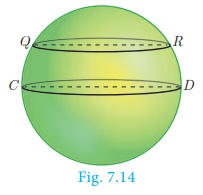
As shown in the diagram, circle with CD as diameter is a
great circle, whereas, the circle with QR as diameter is a small circle.
Surface area of a sphere
Archimedes Proof
Place a sphere inside a right circular cylinder of equal diameter
and height. Then the height of the cylinder will be the diameter of the sphere.
In this case, Archimedes proved that the outer area of the sphere is same as
curved surface area of the cylinder.
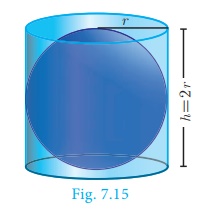
That is, Surface area of sphere =curved surface area of cylinder
= 2πrh = 2πr (2r)
Surface area of a sphere = 4πr2 sq.units
1. Hemisphere
A section of the sphere cut by a plane through any of its great
circle is a hemisphere.
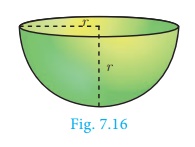
By doing this, we observe that a hemisphere is exactly half the
portion of the sphere.
Curved surface area of hemisphere = 
C.S.A. of a hemisphere = 2πr2 sq.units
Total surface area of hemisphere = C.S.A. +Area of top circular
region
= 2πr 2 +πr2
T.S.A. of a hemisphere = 3πr2 sq.units
2. Hollow Hemisphere
Let the inner radius be r and outer radius be R,
then thickness = R−r
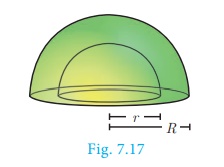
Therefore, C.S.A. = Area of external hemisphere + Area of
internal hemisphere
= 2πr2 + 2πr2
C.S.A. of a hollow hemisphere = 2π(R2
+ r2 ) sq. units
T.S.A. = C.S.A. + Area of annulus region
= 2 π (R 2 + r2 ) + π (R
2 −r2 )
= π [2R2 + 2r2 + R2
− r2]
T.S.A. of a hollow hemisphere = π(3R2 +
r2 ) sq. units
Example 7.8
Find the diameter of a sphere whose surface area is 154 m2.
Solution
Let r be the radius of the sphere.
Given that, surface area of sphere = 154 m2
4πr2 = 154
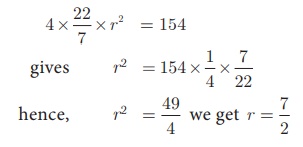
Therefore, diameter is 7 m
Example 7.9
The radius of a spherical balloon increases from 12 cm to 16 cm as air being pumped into it.
Find the ratio of the surface area of the balloons in the two cases.
Solution
Let r1 and r2 be the
radii of the balloons.
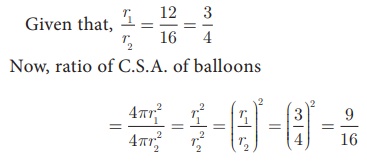
Therefore, ratio of C.S.A. of balloons is 9:16.
Example 7.10
If the base area of a hemispherical solid is 1386 sq. metres, then find
its total surface area?
Solution
Let r be the radius of the hemisphere.
Given that, base area = πr2 = 1386 sq. m
T.S.A. = 3πr2 sq.m
= 3 ×1386 = 4158
Therefore, T.S.A. of the hemispherical solid is 4158 m2
Note
For finding the C.S.A. and T.S.A. of a hollow sphere, the formulla for finding the surface area of a sphere can be used.
Example 7.11 The internal and external radii of a hollow
hemispherical shell are 3 m and 5 m respectively. Find the T.S.A. and C.S.A. of the shell.
Solution Let the internal and external radii of the
hemispherical shell be r and R respectively.
Given that, R = 5 m, r =3 m
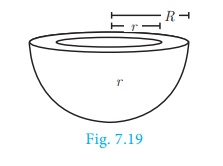
C.S.A. of the shell = 2π(R2 + r2
) sq. units
= 2 × (22/7) × (25 + 9) = 213.71
T.S.A. of the shell = π (3R2 + r2
) sq. units
= (22/7) × (25 + 9) = 264
Therefore, C.S.A. = 213.71 m2 and T.S.A. =
264 m2.
Example 7.12
A sphere, a cylinder and a cone (Fig.7.20) are of the same radius,
where as cone and cylinder are of same height. Find the ratio of their curved
surface areas.
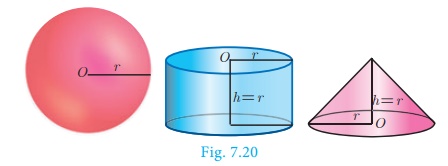
Solution
Required Ratio = C.S.A. of the sphere: C.S.A. of the cylinder :
C.S.A. of the cone
=
4πr2
: 2πrh : πrl , (l = √[r 2 + h2
] = √[2r2]
= √2r units)
=
4 : 2: √2 = 2√2 : √2 : 1
Related Topics